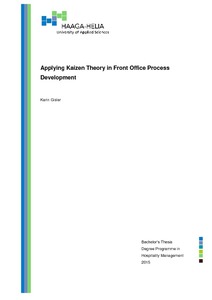Applying Kaizen Theory In Front Office Process Development
Gisler, Karin (2015)
Gisler, Karin
Haaga-Helia ammattikorkeakoulu
2015
All rights reserved
Julkaisun pysyvä osoite on
https://urn.fi/URN:NBN:fi:amk-2015091514627
https://urn.fi/URN:NBN:fi:amk-2015091514627
Tiivistelmä
This thesis is an action research that implements Kaizen Improvement Theory in a hotel front office. Kaizen is Japanese for continuous improvement and it focuses on improving processes with small changes and without the need for large capital investments. It is the base of the modern Lean Theories and although it originates from the manufacturing industry, the methods can be applied to the service and hospitality industry as well.
The aim is to improve the effectiveness of front office operations together with the staff of Radisson Blu Royal which is the commissioning hotel in Helsinki and the researcher acts as a project leader. The thesis follows the Six Step Kaizen Event guideline to create target conditions, which are the desired state of the processes in the future and implements the changes using the techniques and strategies of Kaizen. The changes are made by the staff and they create the new standard processes to be used to reach the target condition
Action research allows for the use of a variety of methods and the ones used to gather data in this Kaizen event are interviews, observation and workshops. The research methods are introduced together with the theory of action research but the results themselves are discussed with the steps of the Kaizen Event that they relate to.
The timeline for this project was six weeks including testing and feedback but the schedule was extended to 8 weeks to adapt to the working schedule of the employees. This included the preparations at the hotel, interviews, observation, workshops, implementation and evaluation of the project.
To measure the benefits gained from this Kaizen event, quantitative measurements were used by asking the same questions in the beginning and in the end of the project. The results showed that employee satisfaction and the effectiveness of operations decreased during the project but the results are inconclusive because the staff members were also affected by a very stressful and difficult summer season. The feedback that was given by the staff about the project itself showed moderate success, but the implementation of new methods was unsuccessful. This was due to the vacations of key staff members and the lack of time to dedicate for the project.
The recommendations given to the hotel based on this thesis focused on the lack of staff resources and sharing of responsibility that prevent the staff from implementing planned changes as there was no clear division of tasks.
The aim is to improve the effectiveness of front office operations together with the staff of Radisson Blu Royal which is the commissioning hotel in Helsinki and the researcher acts as a project leader. The thesis follows the Six Step Kaizen Event guideline to create target conditions, which are the desired state of the processes in the future and implements the changes using the techniques and strategies of Kaizen. The changes are made by the staff and they create the new standard processes to be used to reach the target condition
Action research allows for the use of a variety of methods and the ones used to gather data in this Kaizen event are interviews, observation and workshops. The research methods are introduced together with the theory of action research but the results themselves are discussed with the steps of the Kaizen Event that they relate to.
The timeline for this project was six weeks including testing and feedback but the schedule was extended to 8 weeks to adapt to the working schedule of the employees. This included the preparations at the hotel, interviews, observation, workshops, implementation and evaluation of the project.
To measure the benefits gained from this Kaizen event, quantitative measurements were used by asking the same questions in the beginning and in the end of the project. The results showed that employee satisfaction and the effectiveness of operations decreased during the project but the results are inconclusive because the staff members were also affected by a very stressful and difficult summer season. The feedback that was given by the staff about the project itself showed moderate success, but the implementation of new methods was unsuccessful. This was due to the vacations of key staff members and the lack of time to dedicate for the project.
The recommendations given to the hotel based on this thesis focused on the lack of staff resources and sharing of responsibility that prevent the staff from implementing planned changes as there was no clear division of tasks.
